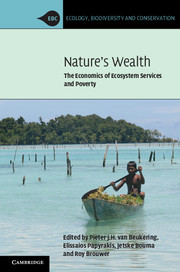Book contents
- Frontmatter
- Contents
- List of contributors
- Acknowledgements
- 1 The economics of ecosystem services and poverty
- Part I Biodiversity-related ecosystem services
- Part II Marine-related ecosystem services
- 5 The role of marine protected areas in alleviating poverty in the Asia-Pacific
- 6 Economics of conservation for the Hon Mun Marine Protected Area in Vietnam
- 7 A multi-criteria approach to equitable fishing rights allocation in South Africa’s Western Cape
- Part III Forest-related ecosystem services
- Part IV Water-related ecosystem services
- Part V Land-related ecosystem services
- Index
- References
6 - Economics of conservation for the Hon Mun Marine Protected Area in Vietnam
Published online by Cambridge University Press: 05 July 2013
- Frontmatter
- Contents
- List of contributors
- Acknowledgements
- 1 The economics of ecosystem services and poverty
- Part I Biodiversity-related ecosystem services
- Part II Marine-related ecosystem services
- 5 The role of marine protected areas in alleviating poverty in the Asia-Pacific
- 6 Economics of conservation for the Hon Mun Marine Protected Area in Vietnam
- 7 A multi-criteria approach to equitable fishing rights allocation in South Africa’s Western Cape
- Part III Forest-related ecosystem services
- Part IV Water-related ecosystem services
- Part V Land-related ecosystem services
- Index
- References
Summary
Introduction
Marine and coastal resources in Vietnam are under increasing threat from human activities (Burke et al. 2002). One way to manage these threats is through Marine Protected Areas (MPAs), which safeguard valuable ecosystems within their confines. Despite the ecological and socio-economic benefits they provide (Whittingham et al. 2003), the management of MPAs is often severely constrained by both a lack of funding and a poor relationship with communities living around (or within) them.
Although many efforts aimed at coral reef management and conservation within MPAs in Vietnam have been initiated and implemented, policymakers repeatedly face questions such as how do local residents feel they have been affected by the establishment of the MPA? Will active management of an MPA provide greater net economic benefits in the long term? How can these benefits be ‘captured’, both to fund MPA management and provide socio-economic stability for local communities?
Using the HonMun MPA as an example, this study explores the relationships between (1) the economic value of coral reefs, (2) coastal livelihoods, (3) coral reef degradation and (4) possible policy interventions in Vietnam. We estimated the economic value of coral reefs in the Hon Mun MPA through a focus on reef fisheries and reef-related tourism, as well as non-use values provided by reef ecosystems. Livelihood aspects of reef use were investigated by engaging with different reef stakeholders. We found out how villagers perceived changes in both quality of life and resources, and uncovered their views on resource impacts on human activities. To derive a decision-making framework for the MPA management options, we analysed the costs and benefits of a ‘with MPA management’ scenario and a ‘without MPA management’ scenario. We also established linkages between economic values of coral reefs, financial sustainability and local socioeconomic issues.
- Type
- Chapter
- Information
- Nature's WealthThe Economics of Ecosystem Services and Poverty, pp. 134 - 154Publisher: Cambridge University PressPrint publication year: 2013



